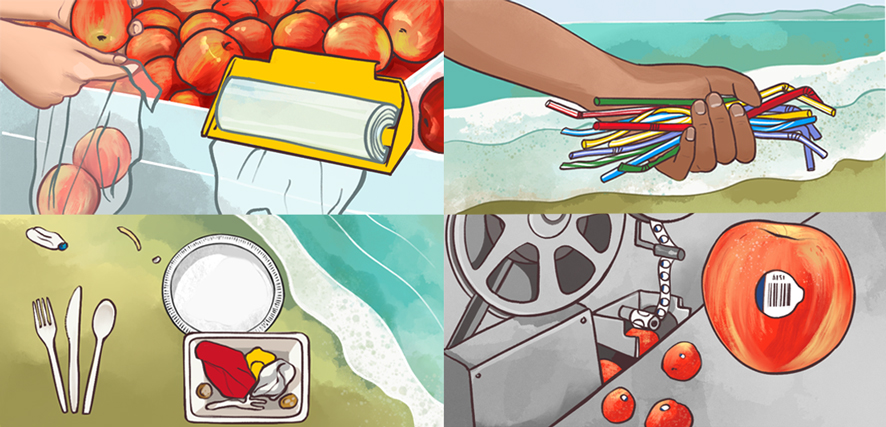The Government is phasing out certain hard-to-recycle plastics and six single-use items in three tranches over 2022, 2023 and 2025.
Plastic straws, plastic plates, bowls and cutlery are being phased out in 2023.
Shifting away from hard-to-recycle and single-use plastics will help reduce plastic waste, improve our recycling systems and protect our environment. This shift is also part of a wider ambition to move Aotearoa New Zealand towards a low-emissions, low-waste economy.
Find out more about the plastic products banned, and the timeline for the phase-outs:
From 1 October 2022 it became illegal to provide, sell or manufacture the following plastic products in Aotearoa New Zealand:
- Single-use plastic drink stirrers (all plastic types)
- Single-use plastic cotton buds (all plastic types)
- Plastics with pro-degradant additives (subset of plastic type 7)
- Certain PVC food trays and containers (plastic type 3)
- Polystyrene takeaway food and beverage packaging (plastic type 6)
- Expanded polystyrene food and beverage packaging ((plastic type 6).
Alternatives
Instead of single-use plastic drink stirrers, you can manufacture or supply:
- Reusable spoons
- Wooden (fibre) drink stirrers ideally free from intentionally added per and polyfluoroalkyl substances (PFAS).
Reusable spoons (eg, metal) are a better alternative to single-use drink stirrers made from other materials (eg, wood) because they create less waste.
From 1 July 2023 the following products are banned, or being phased out:
Single-use:
- plastic produce bags
- plastic plates, bowls and cutlery
- plastic straws*
- plastic produce labels
*Plastic straws will be available for disabled people and medical use
Alternatives:
- Alternatives to single-use plastic drinking straws include: reusable straws (eg, metal and silicon), paper straws, going without a straw altogether.
- Alternatives to single-use plastic tableware and cutlery include: reusable tableware or cutlery (eg, ceramic, stainless steel, melamine plastic), paper or bamboo tableware or cutlery — ideally without intentionally added Perfluoroalkyl and Polyfluoroalkyl Substances (PFAS) — (see key terms for more information on PFAS).
- While single-use plastic produce bags will no longer be permitted, the following alternatives may be used: Fibre-based (paper) produce bags. The Ministry recommends that all fibre-based products are free from Perfluoroalkyl and Polyfluoroalkyl Substances (PFAS) — See key terms for more information on PFAS, Reusable produce bags that are not single-use. Single-use for an item means the item is designed or intended to be used only once or a limited number of times before being disposed of, discarded or diverted, you can also go without a bag altogether when picking out produce to purchase.
From mid 2025 all other PVC and polystyrene food and drink packaging is to be phased out. (This information is indicative only and subject to change.)

For the 1 July phase out:
- Stop ordering and providing the banned products.
- Order alternatives as soon as possible (see Choosing alternative products).
- If you manufacture a banned product, consider the alternative materials you could use instead.
Consider what to do with any excess stock
- Do not stockpile unused products as you are no longer permitted to sell or provide them for free to customers.
- Find out if excess stock can be recycled – this depends on the type of plastic and its use. Contact your supplier and local recyclers.
- See a list of New Zealand recyclers on the Plastics NZ website.
- Ask your supplier if excess stock can be returned.
Inform your team and customers
- Tell your team about the changes and how your business is going to avoid or replace plastic tableware or plastic produce bags.
- Train staff to communicate the change to your customers.
- Help your customers by communicating the change early.
- Remind customers that the bans have been introduced by the Government. They apply to all businesses and are not optional.
For help with talking to customers about the changes, see Talking to others about the 1 July bans (opens in new window).
What happens if you don’t comply
All businesses are legally obligated to comply with the regulations. The Ministry for the Environment will first work with businesses to ensure they understand their obligations, however penalties apply for non-compliance. If enforcement action is taken, fines of up to $100,000 per offence could apply.
Read more: Saying goodbye to single use plastics (April 2023)
